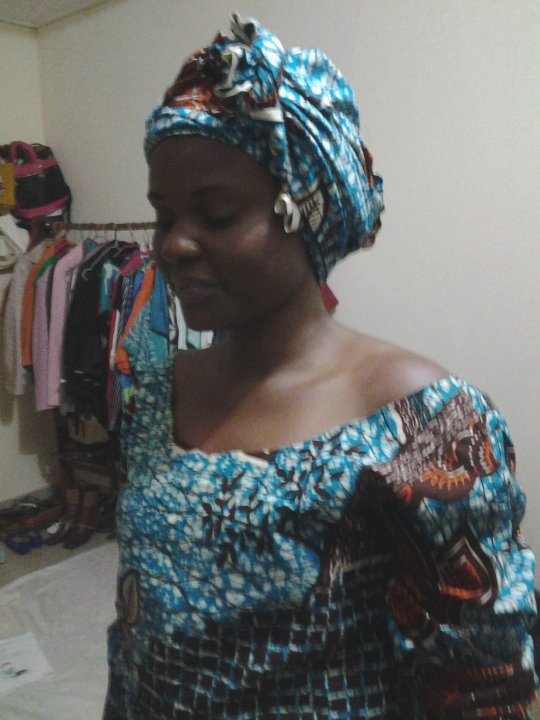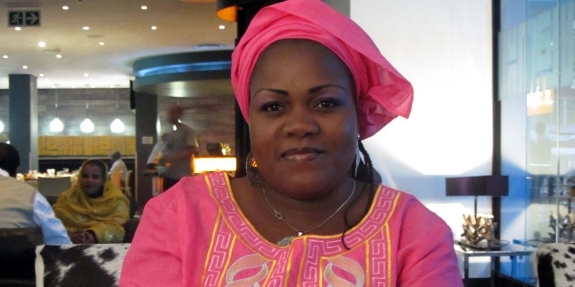Benin | How an undercover reporter was secretly smuggled back to safety
I have been warned: 'please, you mustn't trust any authorities'. So it's up to me to get Tobore to safety. At the agreed meeting point in Cotonou, I get out of my car and look among the people at the bus stop for someone resembling Tobore’s photo. But the short, skinny, terrified-looking creature in jeans with the head scarf recognises me first. “Is Reece?”
My seasoned colleague and fellow investigative journalist Tobore Ovuorie, so poised and confident in her photograph, looks more like a lost little girl. I embrace her and help her into my car, where she bursts into tears. She takes off her scarf and reveals a practically bald head with only a few tufts of hair. "Reece, they cut me, they cut my hair," she repeats. She will continue to cry most of the following days as well.
The doctor, whom we visit to get treatment for her bruises, as well as some pain killers, calmants and sleeping tablets, takes me aside after seeing Tobore. “Please take good care of her. This girl has seen the devil. She is in shock and needs time to recover.” Whilst Tobore rests and I and our colleagues in Nigeria and Amsterdam help plan for her return to Nigeria, I note down what I know about human traffic in my town, Cotonou, for the purposes of this story.
Money for kids and a nice apartment
Prostitution is legal in Benin and it is no secret that, daily, girls from other countries enter here to either work in our red light district Jonquet, or to be trafficked onward to other places. Most do this voluntarily; in my work as a health reporter, I have met many women who work as prostitutes in my town just to send money home. Gift, from Ghana, recently told me she relies on sex work to feed and educate her two children back in Ghana. Her pimp apparently gets her good customers. “Tourists, businessmen, the hotels phone us to service them.” Nigerian Adesio, in her thirties, confided she felt lucky when she became the girlfriend of a trafficker who set her up in a nice apartment and helped her find VIP clients. “But he started to beat me up after a year and then I decided to run, change my identity and begin again as an independent. Another lover helped me to do that.”
Many local girls also work as prostitutes simply for the sake of money. At Benin’s University premises, ‘Club U’ ‘helps’ female students to put themselves through school. “If you look good, male students involved in the business will approach you on campus and offer you a job,” law student Ingrid (19) has told me. “I am an orphan. I work here three years now and it pays for my food and shelter as well as my studies. We have good clients: celebrities, parliamentarians and executives.”
As a result, the average visitor to Cotonou’s Jonquet area might consider reports on the horrors of human traffic or exploitation by pimps greatly exaggerated. And when I interview Cotonou’s police commissioner Pierre Agossadou, he also states that there is, in fact, no problem with human traffic in Benin. “These girls are all here voluntarily. Prostitution is legal in Benin, so we don’t need to arrest people and we don’t need a rescue programme.”
Rapist police, trafficking embassies
But that is on the surface. The truth is that, even if sex work is legal, sex workers in my country – be they foreign or local – cannot call on any service or authority if they encounter problems. Abuse, rape, confiscation of mobile phones and passports – like in Tobore’s case – are rife, and health care to cure STDs or treat HIV/AIDS is practically unavailable if you don’t have money. And rather than receive assistance from the police if you are beaten, held against your will or raped, the police adds its own abuse. Many sex workers have reported ‘arrests’ of sex workers on the pretext that they are ‘in undesirable situations in public’, and subsequent abuse, theft of earnings and rape on the premises of police stations. When I confront Commissioner Agossadou about this, he accepts that such ‘incidents’ take place, but shrugs them off as the work of a ‘few rotten apples’.
Similarly unbothered are the embassies of Nigeria and Ghana, the two main feeder countries to Benin’s sex transit industry. A contact at the Nigerian embassy, who asks to remain anonymous, is of the view that ‘they’ are here out of their own volition and that the embassy has never been presented with a request for help. (This is probably correct. Tobore and I had been warned unofficially that to ask for help here would be a very bad idea, since the institution would be infiltrated by traffickers. Other Nigerian women would have heard similar rumours.) At the Ghanaian embassy I wait for an hour without finding anyone willing to comment.
“If you can’t fight them, join them,” seems to be the response of the authorities
Lavish budgets, no capacity
So what of all the funds spent by global donors and institutions on fighting human traffic from Nigeria? Apparently, this fight stops at the Nigerian border. Benin’s government and police officials admit privately (again begging anonymity) that they know very well that there is a problem with criminal syndicates who abuse and enslave sex workers. They also admit that there are lavish budgets for anti-human traffic cooperation between the police in Benin and Nigeria, with funds paying for many salaries in this line of work. “But we simply don’t have the capacity to investigate the syndicates and assist victims,” a high-ranking police officer admits.

Since the same officer also admits that there is abundant donor money to do precisely that, the ‘lack of capacity’ he refers to can only be a lack of leadership, proper execution of duties and political will. Judging by the cowardly responses received on the record, and the crime syndicates’ hold on border and local authorities, I can only conclude that Benin’s security forces have long since decided to adhere to the adage that ‘if you can’t fight them, join them.’
Private escape
After a few days of rest, medical care, good food and shopping for new outfits, a phone and a wig, Tobore has recovered sufficiently to make the trip back to her home country. We have to disguise her since the criminals are probably still looking for her, hell bent on revenge. In a private convoy, with Tobore dressed as a market woman, with flowering blue boubou, matching blue scarf and comfortable market slippers, I and my friends wave her back through the Seme border post.
I can only hope she recovers well from her ordeal and that the story will cause the powers that be, finally, to act. For there are hundreds of convoys of women who have seen the devil still coming through our border every single day.
Reece Adanwenon is a veteran health reporter based in Benin. Passionate about her country’s development, she specialises in investigating health service delivery


